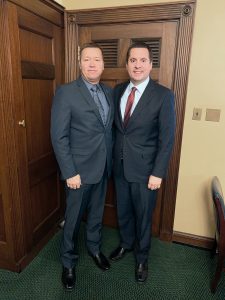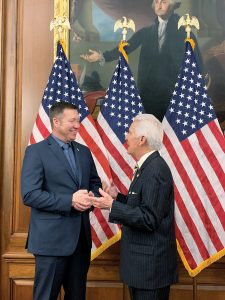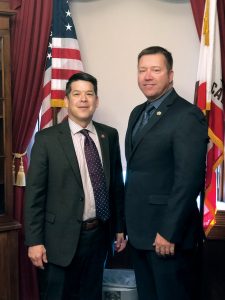Darryl Nirenberg
Partner
Eva Rigamonti
Associate
Lesley Brock
Legislative Assistant
Steptoe & Johnson LLP

During the last week of January, PORAC Vice President Damon Kurtz visited Capitol Hill for a busy day of meetings with members of Congress and their staff. Mr. Kurtz met with representatives from nearly a dozen congressional offices and met directly with five members of Congress.
Vice President Kurtz’s visits served several purposes. It enabled him to introduce himself as PORAC’s new vice president. He was able to lay out PORAC’s legislative priorities for the year: law enforcement funding, criminal justice reform and pension and labor reform. He shared PORAC’s new engagement initiative, the federal legislative scorecard, which PORAC debuted to association members during the November Annual Conference. The legislative scorecard will track a member’s legislative actions on PORAC’s priority bills, as well as his or her engagement with the association both in Washington, D.C. and in the member’s California district. The members with whom Kurtz met applauded PORAC for creating the scorecard and agreed that it could be an effective tool to increase the association’s visibility on Capitol Hill. A number also expressed interest in contributing independent op-eds to PORAC’s monthly magazine, so look out for them here in the coming months!
We look forward to continuing these discussions with those members, as well as with the rest of the California representatives before, during and after PORAC’s Board of Directors fly-in, scheduled for late March.
Attorney General William Barr Confirmed by the Senate, Will Assume Responsibilities Immediately
On February 14, the Senate approved 54–45 on a mostly party-line vote the nomination of William Barr for U.S. Attorney General. Three Democrats, Senators Doug Jones (Alabama), Joe Manchin (West Virginia) and Kyrsten Sinema (Arizona), voted with Republicans in support of Barr. Republican Senator Rand Paul (Kentucky) was the sole Republican to oppose Barr.
Among the primary issues that AG Barr will have to address immediately is how to handle Special Counsel Robert Mueller’s investigation into Russia’s efforts to interfere in the 2016 presidential election. As a public citizen, Barr was an outspoken critic of the investigation, but during his confirmation hearings earlier this year, Barr told senators on the Senate Judiciary Committee that he would not obstruct the investigation. Currently, Deputy Attorney General Rod Rosenstein is leading the investigation but is expected to announce his resignation in the coming weeks.
AG Barr likely will reprioritize existing DOJ initiatives to better align with his own policy priorities and positions. Although Barr, like former Attorney General Jeff Sessions, is a hard-liner on immigration and is historically tough on crime, Barr expressed a willingness during his confirmation hearings to loosen his stance on criminal justice. He assured senators on the Judiciary Committee that he would implement the new criminal justice reform law, the First Step Act, as written. Barr also told senators that the DOJ would work with state and local law enforcement on issues such as gang violence, human trafficking and immigration. Barr additionally distanced himself from Sessions’ tough position on marijuana, telling senators that he would not target marijuana companies in states that have legalized the drug.
AG Barr begins his tenure at the DOJ immediately.
PORAC-Endorsed Social Security Legislation Reintroduced

On January 31, Representative Rodney Davis (R–Illinois) reintroduced the Social Security Fairness Act of 2019 (H.R. 141). The bill would repeal two provisions of the Social Security Act: the Government Pension Offset (GPO) and the Windfall Elimination Provisions (WEP) that penalize workers who split their career between jobs that contribute to Social Security and jobs that do not (usually state or local jobs like law enforcement). The GPO and the WEP slash the Social Security benefits that PORAC members are entitled to by two-thirds.
The WEP reduces Social Security benefits for workers that receive a public pension from their previous job (where they did not contribute to Social Security), disadvantaging public safety officers who retire and then take a position in the private sector.
And, under the GPO, if a law enforcement officer’s spouse dies and that spouse had contributed to Social Security, then the law enforcement officer would not receive half of the spouse’s Social Security benefits like most other Americans would. Instead, the public safety officer’s benefits he or she would have received from his or her spouse would be offset by two-thirds of the officer’s public pension, thereby eliminating most or all of the Social Security benefits that the officer should have received.
PORAC has endorsed multiple versions of H.R. 141 in the past and will continue to support legislation that would preserve Social Security benefits in retirement, as well as other bills that would fix the public pension system.
High Court Expands What Constitutes a Violent Felony

In a 5-4 decision, the U.S. Supreme Court ruled that a robbery conducted with force sufficient to overcome a victim’s resistance constitutes “physical force,” satisfying the requirement of a violent felony under the federal Armed Career Criminal Act. The act requires a mandatory 15-year sentence for those convicted of firearm possession if they previously had been found guilty of three violent felonies or serious drug charges — a sort of three-strikes policy.
In Stokeling v. United States, Denard Stokeling was arrested for burglary in 2015 after being caught on camera and identified by several witnesses. When Mr. Stokeling was arrested, police officers found a gun in his backpack. Mr. Stokeling had three felonies in 1997 on his record, possibly triggering the Armed Career Criminal Act and its mandatory 15-year sentence. Mr. Stokeling’s lawyers argued to the court that one of the felonies, an unarmed robbery in Florida, should not be considered a violent felony under federal law. The majority of the justices disagreed: under Florida law (which considers a felony to be violent if the victim resists), the unarmed robbery was a violent felony, and, therefore, could be considered as one too under federal law.
The majority opinion was issued by Justice Thomas, who was joined by Justices Alito, Gorsuch, Kavanaugh and — surprisingly — Breyer, who usually votes with the court’s liberal wing. Justice Sotomayor penned the dissenting opinion, arguing that the standard offered by the majority meant that, depending on a state’s definition of what level of force constitutes a violent crime, crimes with little to no force at all could be defined as violent felonies under federal law. Chief Justice Roberts and Justices Ginsburg and Kagan joined Justice Sotomayor in her dissent.
